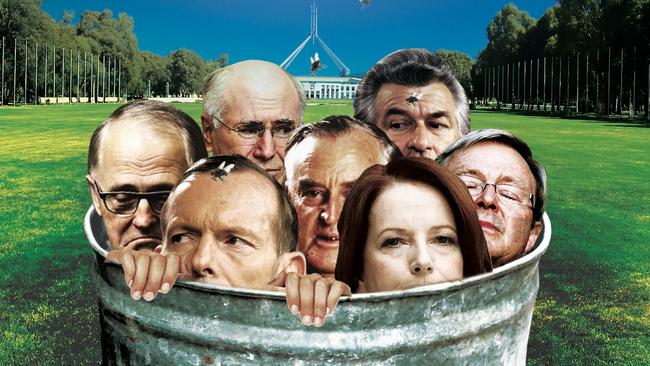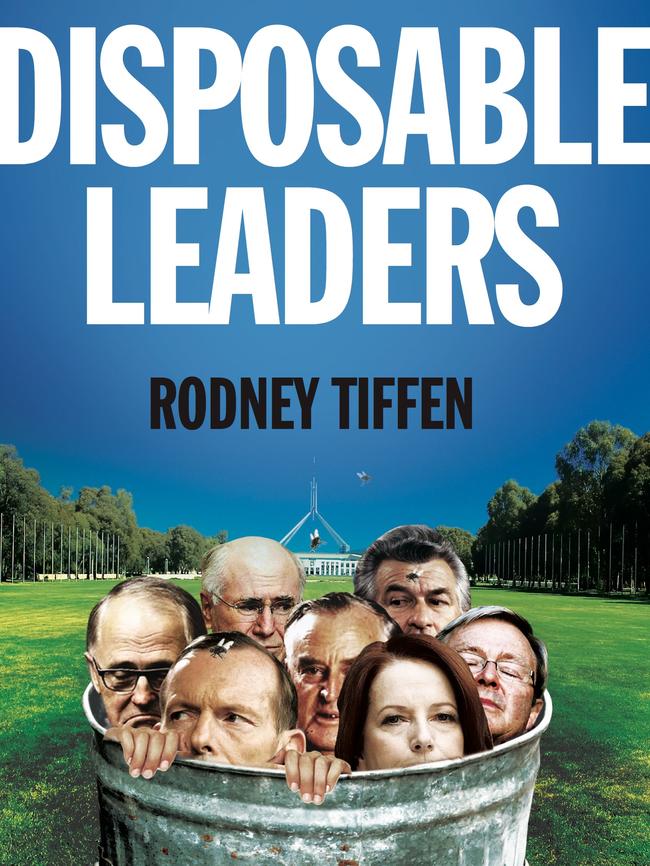Disposable leaders: search for a Messiah so often ends in tears
Only Paul Keating’s takeover from Bob Hawke in 1991 could be considered a success.

The other day I watched an interview with PJ O’Rourke on a US talk show. He was asked to make sense of the global revolt against the political establishment, most notably manifest in Brexit and Donald Trump’s election.
O’Rourke thinks the current crisis of democracy and political disruption has roots in Australia. We have had five prime ministers in five years, he said. We are, apparently, the coup capital of the world.

Australia does not see itself as the spark that ignited the revolution. Some suggest the near-record vote for independents, including for parties led by Pauline Hanson and Nick Xenophon, is a sign that Australia is being swept along with overseas events rather than leading them. Yet Rodney Tiffen’s book Disposable Leaders suggests our coup culture is not only rampant but is gathering pace.
Since 1970, there have been 73 federal and state party leaders put to the sword by their parliamentary colleagues. Our politics has become brutal. But it is a ruthlessness driven by insiders rather than outsiders.
Australia has had a run of short-term PMs before. Between 1901 and 1910, when governments often rose and fell on the floor of parliament, there were seven changes of PM. From 1966 to 1975, there were seven PMs.
Tiffen, an emeritus professor at the University of Sydney, says Robert Menzies became the first PM to be removed by his party, in 1941. He also presents John Gorton as a partyroom casualty in 1971.
Yet Menzies and Gorton fell on their swords to avoid a leadership spill. It was not until 1991 that a Labor PM, Bob Hawke, was felled in a partyroom leadership ballot. And it was not until 2015 that a Liberal PM, Tony Abbott, was defeated in a leadership ballot. Labor has executed Kevin Rudd and Julia Gillard and Liberal PM Malcolm Turnbull remains on deathwatch.
Until the 1970s, seniority and succession planning was the norm. Leaders in a slump were given time to lift their performance. Today, leaders live and die by polls and their colleagues are prone to panic. This is especially the case in opposition, where leadership coups are more frequent.
It may come as a surprise to learn that no other living person has led a party longer than Bob Carr, who was NSW Labor leader from 1988 to 2005. No political leader would last that long today.
In this readable, well-researched book, Tiffen also casts a critical eye over the media. In the frenzy to be the first to call a leader’s demise or reveal a new level of intrigue, the media can often make a leadership change a self-fulfilling prophecy.
This book underscores the importance of leadership in politics.
A PM or premier chairs cabinet, takes the lead in parliament, oversees the bureaucracy, represents the nation abroad, manages the parliamentary party and works closely with its organisational wing.
At a time of ideological convergence, a leader’s personality and values help to define a party. They are a symbol for their party. They are the party’s chief exponent and campaigner. The buck stops with them.
When a party begins to falter, those who fear a looming election rout often look to an alternative leader who can turn their fortunes around — a messiah. But a leadership change does not always guarantee political success.
Seventeen PMs and premiers have been replaced since 1970, but the only new leaders who went on to win re-election are Paul Keating (1993) and Turnbull (2016). Three survived in minority government (Gillard, John Olsen and Jay Weatherill). But 12 lost the next election.
Evidently, changing the PM or premier can be counterproductive. The voters don’t like it because it is not the party leader they voted for. The former leader can be resentful and vengeful. The so-called transaction costs can be high.
Tiffen regards winning the next election as the key factor in judging whether the coup was justified. Certainly Keating’s 1993 election victory, increasing Labor’s primary vote and its seats in parliament, is the standout example of a leadership change paying a dividend.
However, the powerbrokers who brought down Rudd are certain he would have lost the 2010 election. Those who knifed Gillard are equally convinced that Rudd redux saved Labor seats in 2013. The backroom operators who toppled Abbott say he would have lost the 2016 election. The ends, they say, justify the means.
This book could not be timelier.
Turnbull’s prime ministership lacks authority and achievement. The opinion polls are diabolical. The Coalition is losing votes to right-wing fringe parties. Conservative commentators are baying for Turnbull’s blood. And Abbott stalks his leadership.
Turnbull may soon be another tragic leadership statistic. But, as Tiffen says, this is not healthy for Australian democracy or for our image abroad. In the past 50 years, no other country has disposed of as many leaders as we have.
Troy Bramston is a senior writer at The Australian. His latest book is Paul Keating: The Big-Picture Leader.
Disposable Leaders: Media and Leadership Coups from Menzies to Abbott
By Rodney Tiffen
New South, 296pp, $34.99



